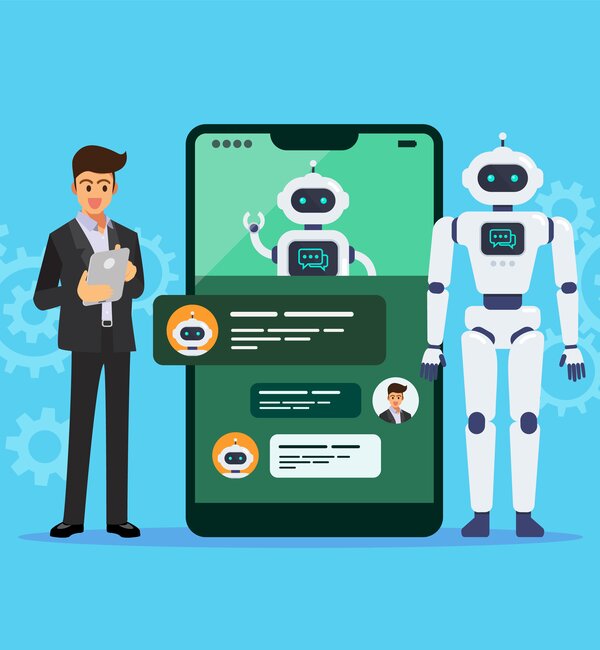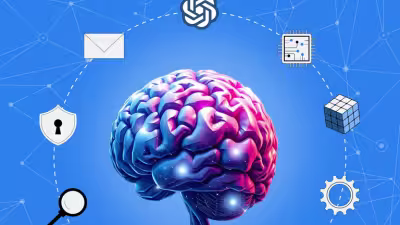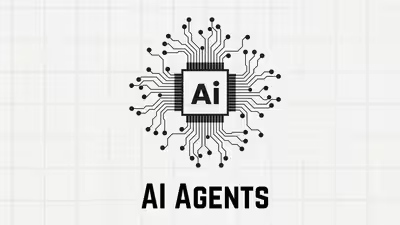
Imagine a digital assistant that not only listens to you but also thinks, learns, and acts on its own to get things done. That’s an AI agent.
In simple terms, an AI agent is a computer system that can:
-
Perceive its environment (like gathering data),
-
Think (processing that data), and
-
Act (make decisions or take actions) —all in pursuit of a goal.
Think of it as the brain behind your smart thermostat, your favorite chatbot, or even the self-driving car you’ve been reading about.
Just like humans, AI agents come in different “personalities” based on how they work. Here’s a quick tour:
1. Simple Reflex Agents
They react to what’s happening right now, with no memory. Like a bug-zapping light—it turns on when it senses a bug.
2. Model-Based Reflex Agents
A bit smarter—they build a mini “map” of the world to make better decisions. Think of them as basic GPS apps that reroute you around traffic.
3. Goal-Based Agents
These agents have specific goals and make choices to reach them. Self-driving cars and smart delivery drones fall into this category.
4. Utility-Based Agents
Not just goal-driven—they also weigh how good or bad different outcomes might be. For example, a stock trading bot aiming to maximize returns while minimizing risks.
5. Learning Agents
These agents learn from past experiences to get better over time. Think Netflix’s recommendations or Amazon’s product suggestions.

AI agents aren’t just cool in theory—they’re already changing the game in real life:
-
Customer Support: Virtual assistants providing quick resolutions on websites.
-
Healthcare: AI systems like IBM Watson assisting doctors with diagnoses.
-
Finance: Robo-advisors managing investment portfolios efficiently.
-
Logistics: Smart warehouses optimizing inventory and delivery routes.
-
Self-Driving Cars: Systems from Tesla and Waymo navigating roads autonomously.
Here’s how to prepare for the AI agent revolution:
1. Define clear goals and metrics to measure success.
2. Invest in data quality and security to enable reliable performance.
3. Start small, scale smart by piloting AI agents in controlled environments.
4. Monitor and improve continuously, with regular audits for fairness and effectiveness.
5. Stay curious and adaptable, keeping up with new developments.
While AI agents offer significant benefits, they also come with certain limitations:
-
Data Dependency: AI agents need large, high-quality datasets for training and performance. Poor data can lead to inaccurate predictions and suboptimal actions.
-
Complexity: Developing and deploying AI agents—especially those involving machine learning or complex architectures—requires specialized skills and resources.
-
Bias and Fairness Concerns: AI agents can reflect biases present in the data, leading to unfair or discriminatory outcomes. Transparency and careful monitoring are essential.
-
Security Risks: AI agents can become targets for cyberattacks. Ensuring robust security protocols and compliance with privacy regulations is vital.
The field is evolving rapidly, and we’re excited about what’s on the horizon:
-
Collaboration Between Agents: Swarms of delivery drones or interconnected service bots could work together seamlessly.
-
Explainable AI: Agents that can clearly explain their decision-making processes, improving trust and compliance.
-
Edge AI: Bringing AI closer to the data source (like IoT devices) to enable faster, real-time decision-making.
-
Human-AI Collaboration: Systems that don’t replace humans but augment their work, enhancing creativity and efficiency.
At Javra, we’re committed to staying at the forefront of these advancements and helping our clients harness their power.
AI agents are no longer just a futuristic concept—they’re here, transforming how businesses operate and interact with customers.
The future of business is smart, seamless, and scalable—and Javra is helping make it a reality.



